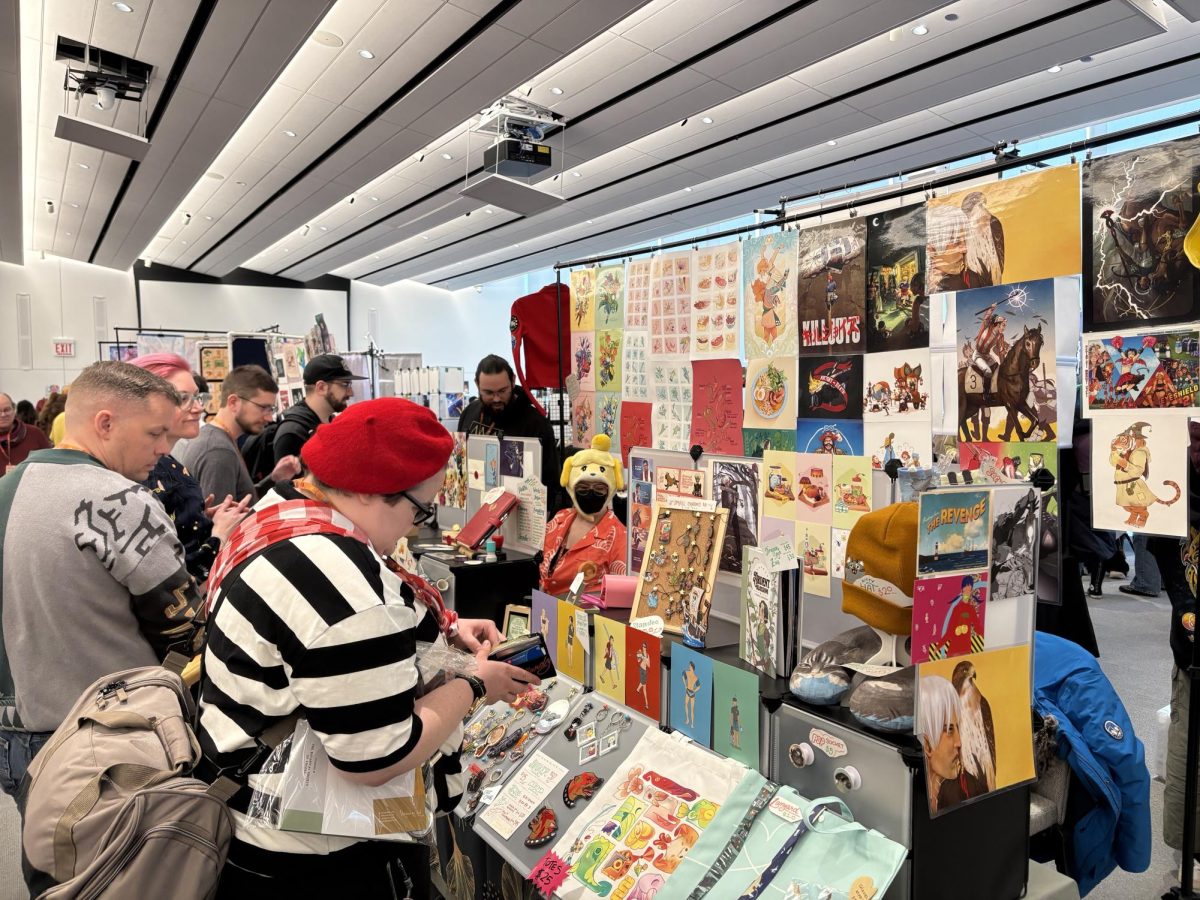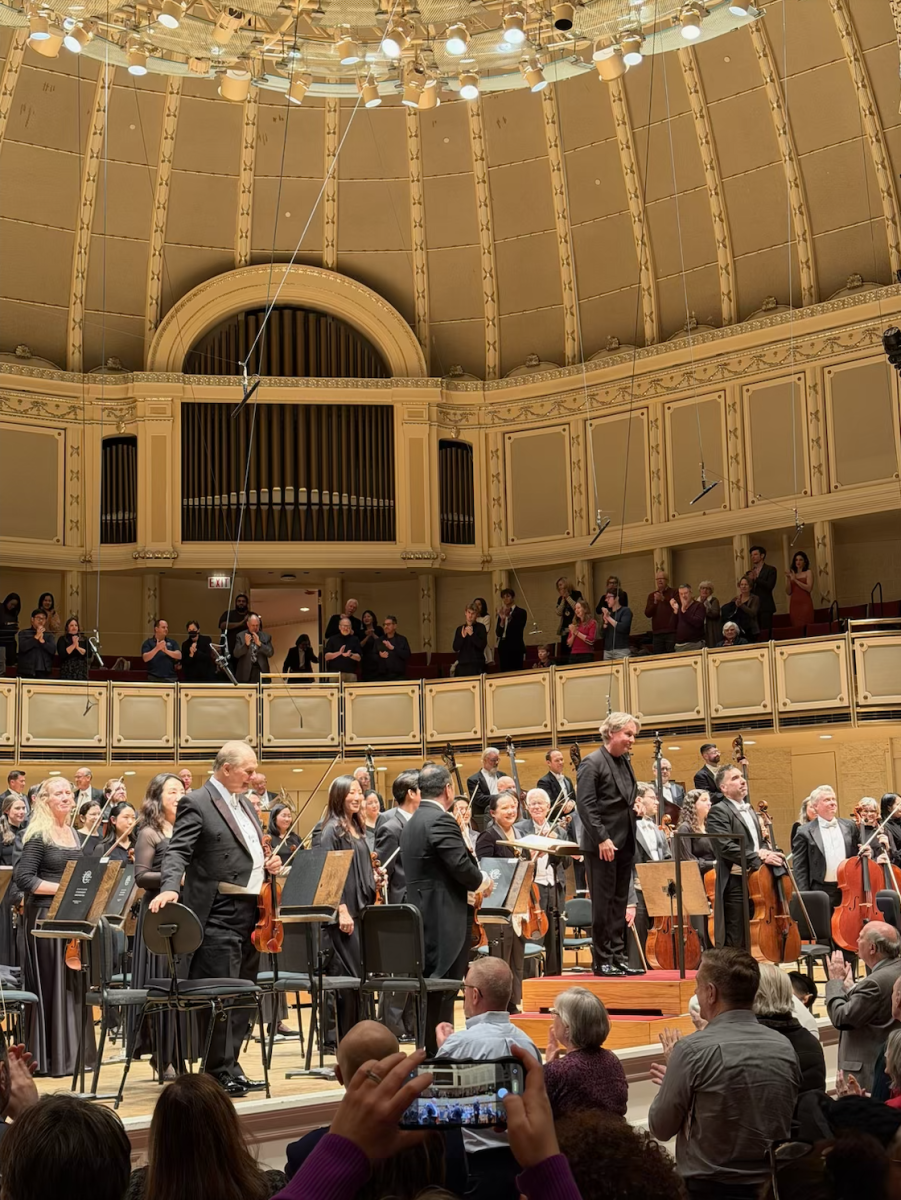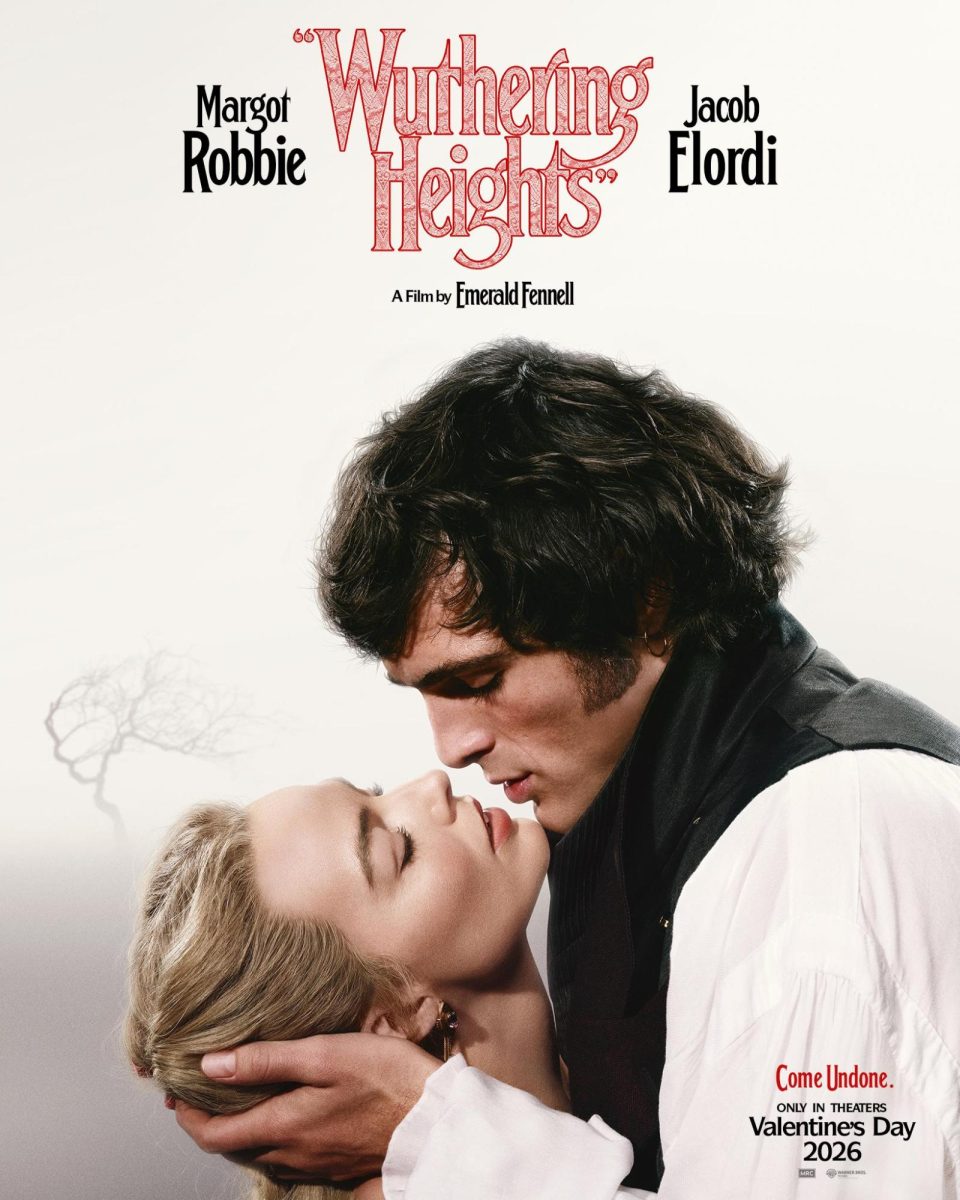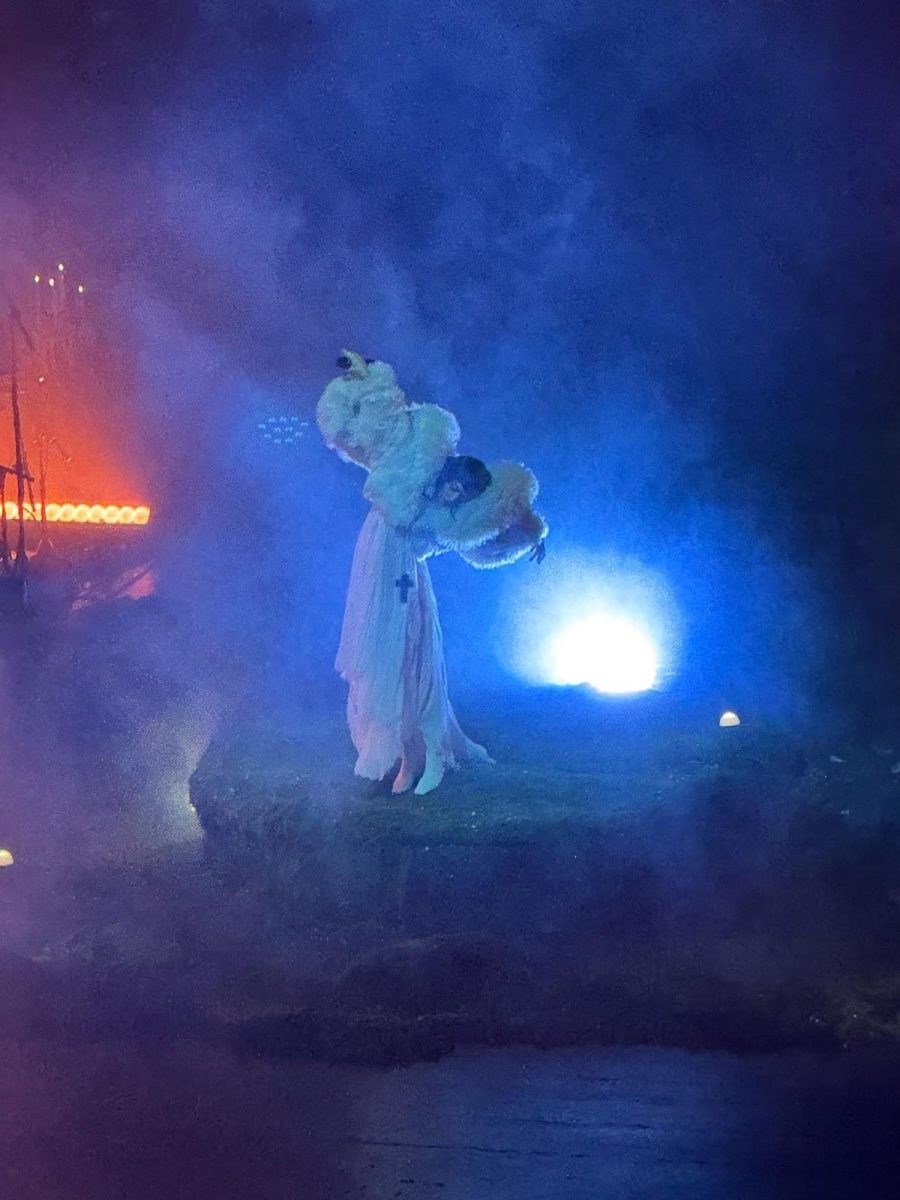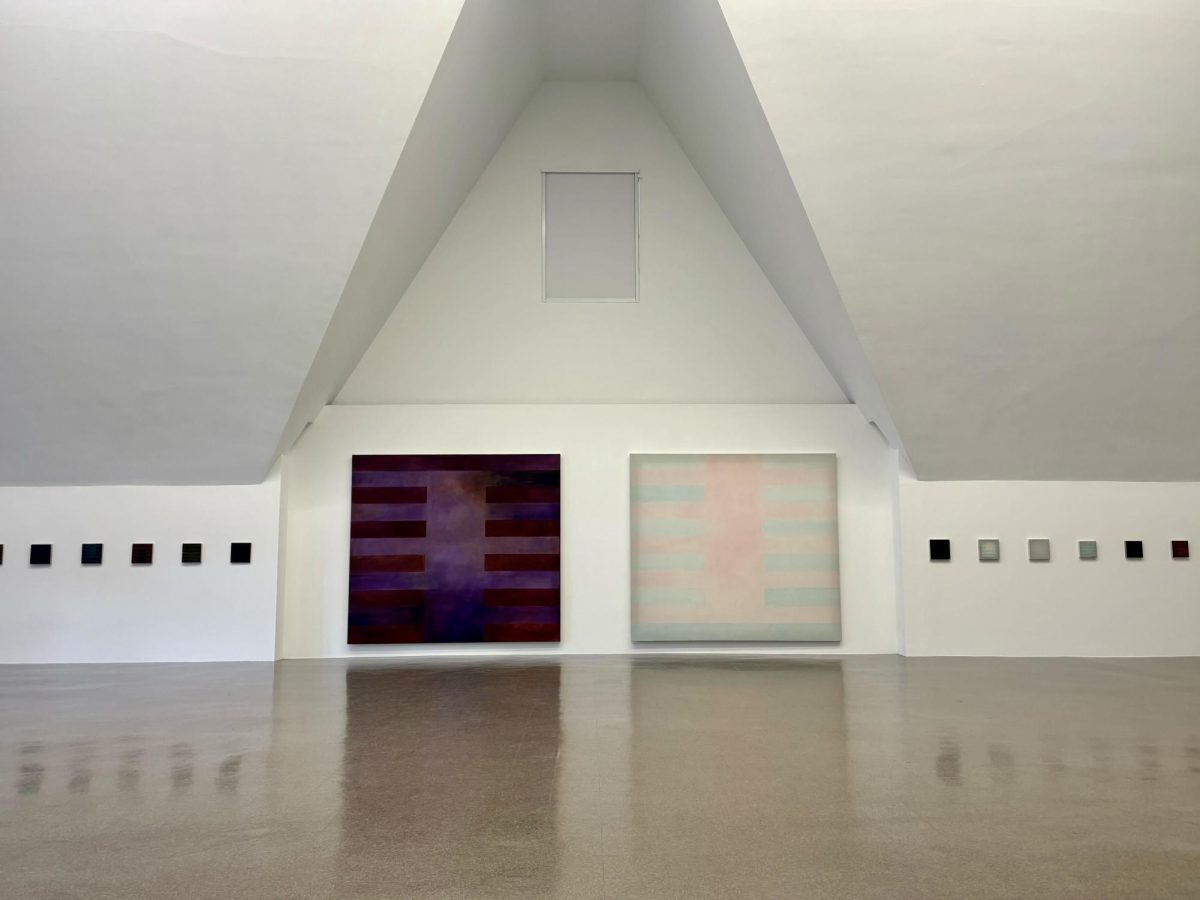Thousands of music lovers around the Midwest went to sleep on the night of July 20 dreaming of the next three days. Come the following Friday morning, their dream-generated energy aggregated into a force field of excitement around Chicago’s Union Park, where Pitchfork Music Festival-–goers converged. They streamed in off the Green Line train with their DePaul University drawstring bags and black-and-white sambas. A lanky figure inked graffiti onto the poster advertising bike storage. “Don’t worry, there’s not going to be too much moshing at this festival,” someone commented nearby. In two days, JPEGMAFIA’s set would prove this onlooker wrong.
We spent the next few days at this year’s Pitchfork festival, in all of its indie rock, overpriced smoothie, occasional mosh pit glory. Our following review features the overheard in all of its forms, from expansive headlining sets to small-stage breakout stars.
Friday
SEN MORIMOTO
Close to the festival gates, Sen Morimoto crooned over a lively trumpet riff—his voice rang out over the crowd. The instrumental melted into “People Watching,” which he delivered comfortably, bar by bar. He introduced a “brand new song” but instead launched into a jazzy cover of Cher’s “Believe” to an audience who seemed to know the words but preferred to leave the singing to the expert. As he turned to new material from his unreleased album, the set took on a new edge. It peaked with his new single “Diagnosis,” where the crowd yelled along: “This is the diagnosis./ It’s a catch-22:/ You live a long life, doing what you have to do.” The line “fuck the cops, the banks, the legislature” inspired an ascension of middle fingers. Ending the set, each of the eight instruments on stage let it all out in a grand cathartic cacophony.
MAVI
On a nearby stage, MAVI played to a younger crowd, including a woman hardcore hula hooping. He invited the crowd to a call-and-response, yelling out, “I been underrated.” The crowd shouted back, “It ain’t nothing new.” His performance proved the statement to be true. Continuing to engage the crowd, he asked them to sing his iconic “just because I love you” refrain off “Self Love.” Warmly relatable, he told the audience: “This is an amazing, life changing experience. I’m not ready for it to be a memory quite yet…Remember my name.” The crowd shouted back, “Mavi!” We will remember his name. And even better, look him up on Spotify.
GRACE IVES
Grace Ives performed a propulsive set to a quickly growing festival crowd. Alone on stage, she danced around the whole space with rock star aplomb. Live, her new album Janky Star brought to mind Lorde’s “Green Light.” A highlight of her set was a rollicking cover of “We Got the Beat” by The Go-Go’s.
AXEL BOWMAN
Walking up to Axel Bowman’s set, you could hear the bass in your heart. He was accompanied by a saxophonist and a drummer, who added a rich textural landscape to his cascading rhythms.
NATION OF LANGUAGE
Live, Nation of Language’s band recalled the ’80s—picture Sonic Youth’s “Teen Age Riot” but with clearer vocals. A big highlight of Nation of Language’s set was Ian Richard Devaney’s billowy white pants. He told the crowd it was his “first time wearing white pants.” Overheard: “His music is cool.” And then, in response: “His pants are really nice.”
PERFUME GENIUS
Fans congregated an hour in advance and were not disappointed when Perfume Genius entered to an epic choral intro, wearing a Mike’s Palace crop top and shoulder-length red latex gloves. When he began to sway his hips and lowered suggestively, the crowd went crazy. He tossed his sunglasses out to them. And then, looking into the sun, he added, “I think I need the sunglasses I tossed, like in a clinical way.” His voice featured a more distinctive rasp than on Set My Heart on Fire Immediately, and his guitarist Meg Duffy had beautiful vocals that stood out on “Chasing.” “Slip Away” took on a more percussive quality live—in the song’s thundering conclusion, Perfume Genius stuck out his arms and stood like the music could carry him away. The towering riffs sent chills through the audience. During his set, the singer wrapped himself in gauze, commenting: “It’s supposed to be antique gold, but it looks like the pee pee poo poo man delivered it.”
LEIKELI47
A highlight of the festival, Leikeli47’s set took the energy up a notch. When we arrived, she had called several audience members up on stage to dance with her, including two UChicago students. The crowd, which had been calm for most of the day, was riotous during her set, mobbing the stage and dancing feverishly. She ended her set with wisdom, telling the Pitchfork crowd: “You wanna know the secret formula? Start and don’t stop. Your youth does not depend on your age. Your youth is your brilliance…your innovation. Whether you’re eight or eighty-eight, you can start.”
THE SMILE
The day closed with Thom Yorke’s The Smile, who opened the set against a beautiful blue background with soaring reverb. Yorke switched instruments easily, languidly, smoke rising around him like a dream. Songs off The Smile’s latest album, A Light for Attracting Attention, bled into each other seamlessly. Whenever Yorke paused, often between songs (he seemed uncomfortable talking to crowds), a voice would rise up from the audience, crying out, “We love you, Thom!” This discomfort was reflected in the music itself. There was a quiet, controlled horror which pervaded the music’s every fiber, especially in the irregular and constantly changing time signatures. It brought to mind a monster that stays under your bed because it would rather not see what’s under the covers.
Saturday
On Saturday, the rain brought with it downsides and upsides. The major downside was that part of the festival was canceled. Palm, Black Belt Eagle Scout, and the rest of the scheduled morning artists played their sets—beautiful, folky, unwinding stretches of music. And then nobody knew what was happening and people were huddled in the field—“away from the metal!” organizers said—and Snail Mail was canceled, inspiring some to take the Green Line home. When the festival started again, nobody knew, and Julia Jacklin played an intimate set to a small crowd.
WEYES BLOOD
What was the upside of the rain? The upside was that the rest of the afternoon was covered in a sort of hazy glow. It rained while Weyes Blood played. She looked angelic, draped in a long white dress. Behind her, a graphic of white stars sparkled. Accompanied by a twinkling instrumental, she called out to the crowd, “This is all for the indie culture.”
CHARLOTTE ADIGÉRY AND BOLIS PUPUL
Nearby, a different sort of indie culture reigned at Charlotte Adigéry and Bolis Pupul, where the crowd pulsed to a blinding bass. The queen of her stage, Charlotte somehow simultaneously made every person in the crowd feel like her best friend. “Touring is super tough,” she said. “I had a dream I had to perform last night and I didn’t know the songs.” Her easy banter broke into a pitch-perfect rendition of “Haha” with storytelling that sucked the audience in. At the frenzied end of her set, she called out, “Let it go, your body knows what to do,” and the audience heeded her request.
BIG THIEF
Big Thief stole our eyes, our ears, and our hearts. Adrianne Lenker and company tucked the crowd into bed after a long, sometimes stressful Saturday. Nearly half of the group’s songs were unreleased, which created a sublimely focused experience. Their sentences oscillated between rest and revolution. Each thought would seem to complete itself comfortably until the following phrase elaborated it into a newly complete thought. “Shoulders” presented a particularly powerful example of this lyrical style: “They found you at the corner./ Your head was doubled over,/ and the blood of the man/ who killed my mother with his hands/ is in me, it’s in me, in my veins.” We didn’t know where we were being taken, yet we followed and were followed by the wealth of Big Thief’s words.
Sunday
The canonical “day of rest” turned out to be perhaps the most energetic day of the festival. Georgia Ellery of Jockstrap tore it up on the electric violin, delivering a futuristic, striking set. Soul Glo played a raging rendition of “We Wants Revenge” with a handle of tequila nearby on stage.
Honorable mention: the crafts section, which had an impressive collection of vendors selling T-shirts, strawberry earrings, and snappy wallets, alongside a children’s play area.
JPEGMAFIA
Peggy brought the festival its otherwise-lacking mosh pits. The majority of the audience stood back and restfully enjoyed his set, but the front of the crowd became its own world. The backwards hat–wearing, muscle tee–sporting, water bottle–throwing population huddled around the stage as if they were at Peggy’s own show. At the start of each song (with the notable exception of his rendition of “Call Me Maybe”), a group shepherded by a man in a dilapidated Shrek mask revolved in an ever-growing circle, accumulating bodies until the beat dropped, at which point everybody threw themselves into the center. Like plants, they photosynthesized, becoming livelier through the 83-degree sunny set. Peggy’s computer did what we humans couldn’t—it overheated.
KILLER MIKE
Killer Mike arrived beside a choir dressed in white. He proclaimed, “This ain’t no underground rap show…this is going to be an experience…today, Chicago, we are in church.” Some in the audience did not want to find God this particular Sunday, while others were invested in Killer Mike’s righteousness. He delivered nothing short of a deliverance, with earthshaking vocals and moving lyricism. At one point, to remind the crowd they were at Pitchfork Music Festival, the beat dropped. The audience piped up. Then he yelled “Sike! I’m playing my new shit!” (referring to his devout album Michael). A standout performance was his song “Motherless,” which he performed with gut-wrenching emotion. Beyond the new album, he included a lovely cover of Sly & the Family Stone’s “Everyday People.” He ended his show with a call to kindness, telling the audience that they should reach out their joints to their neighbors and offer them a hit.
MDOU MOCTAR
Mdou Moctar delivered an energy-infused performance, laden with lively lyrics and guitar phrases. Though most listeners could not understand Moctar’s words sung in Tamasheq, the crowd moved as if each resonated at least as much as the last. Music sung in an unfamiliar language rebrands the voice as a pure instrument for that listener. Moctar’s string and vocal vessels complemented one another, expanding the proverbial spotlight until it took up not just the whole stage, but the crowd with it.
BON IVER
Pitchfork 2023 came to a colorful close with a light show that could’ve been the main act on its own. But we weren’t there for the flashy lights (in fact, we found ourselves closing our eyes to bring ourselves back to the music). Bon Iver generated sounds that reached into our subconscious. Behind his hardware, Justin Vernon interfaced with music as if he were interfacing with the human ethos. There seemed to be a different cache of effects on every track, and each one was done as carefully and lovingly as if Bon Iver were raising a child. Even through the highly technologized sound design, we heard him marry inorganic production devoutly to his organic voice. What was thought to be unknown had always been familiar.
So the hordes of people who entered Union Park left again, streaming out of the gates past enthusiastic hawkers selling counterfeit sweatshirts. All the people who had danced to Leikeli47 together, waited in the rain together, and cried to Big Thief together boarded their trains and their buses and surcharged Lyfts and traveled home. The reservoirs of energy that Pitchfork-goers had built up from the prior week were depleted.
But it’s not like the energy evaporated. It left the reservoirs in strings of streams, supplying nearby life with what is essential. As these reservoirs begin to refill in preparation for whatever comes next, the 2023 Pitchfork Music Festival rests in the soil of our souls. The music remains.



